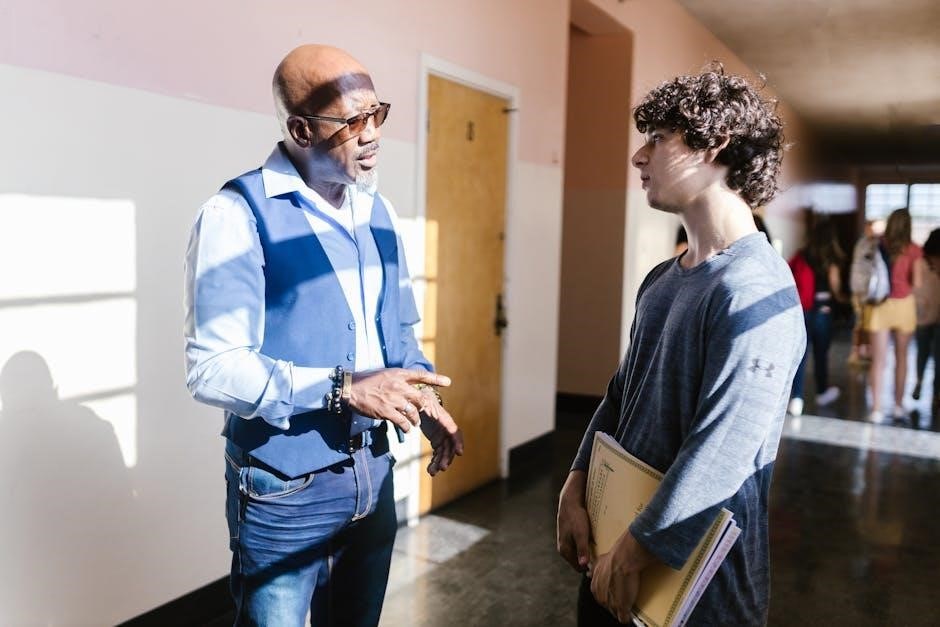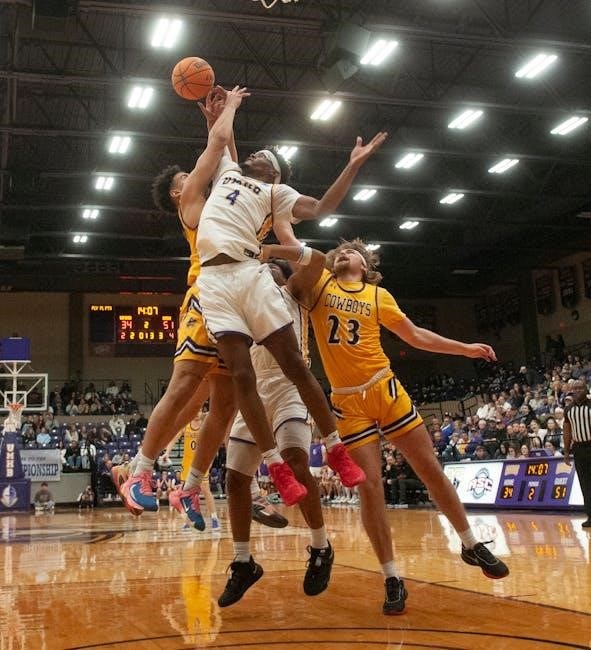Crafting effective emails to college coaches is crucial for student-athletes seeking recruitment opportunities. A well-written email can make a strong first impression, showcasing your skills and passion. Personalization, clarity, and professionalism are key to standing out. Using sample email templates can guide you in creating compelling messages that highlight your achievements and express genuine interest in a program. This section provides insights and examples to help you master the art of emailing college coaches effectively.
Importance of Initial Contact
When reaching out to college coaches, the initial contact is crucial as it sets the tone for your relationship and recruiting process. A well-crafted email can make a strong first impression, showcasing your professionalism and genuine interest in the program. Coaches often receive numerous emails, so standing out early is essential to grabbing their attention.
Your first email should clearly introduce yourself, highlight your athletic achievements, and express why you are interested in their program. This helps coaches quickly assess whether you might be a good fit for their team. A poorly written or generic email may be overlooked, while a thoughtful one can open the door to further communication.
Initial contact also demonstrates your initiative and seriousness about playing at the collegiate level. Coaches appreciate athletes who take the time to research their program and tailor their message. By starting the conversation early, you build a foundation for a potential recruiting relationship;
Remember, your first email is your chance to make a lasting impression and start building a connection. Keep it concise, professional, and personalized to ensure it resonates with the coach.

Overview of the College Recruiting Process
The college recruiting process is a structured journey that athletes and their families navigate to secure a spot on a college team. It typically begins with research and identification of potential colleges and programs that align with academic and athletic goals. Student-athletes often create a list of target schools, considering factors like athletic division, team performance, and academic offerings.
The process involves several stages, including initial contact with coaches, submitting highlight reels, and participating in camps or showcases. Coaches evaluate potential recruits based on athletic ability, academic eligibility, and personal character. Communication is key, with emails, phone calls, and in-person visits playing significant roles.
A timeline is crucial, as recruiting often starts in the freshman or sophomore year of high school. By junior year, athletes typically narrow down their options, and seniors finalize decisions. Official visits, National Letter of Intent signings, and adherence to NCAA guidelines are critical steps in the process.
Understanding this structure helps athletes and families manage expectations and stay proactive. Effective communication, particularly through well-crafted emails, is vital for standing out and building relationships with coaches.

Understanding the College Recruiting Process
The college recruiting process involves identifying potential colleges, communicating with coaches, and understanding timelines. It requires athletes to showcase their skills, meet eligibility criteria, and build relationships with coaches. A clear strategy and proactive approach are essential for success.
Why Email is a Critical Tool
Email serves as a direct and professional means of communication with college coaches, allowing athletes to present themselves effectively. It provides a permanent record of correspondence, which can be referenced later. Coaches often prefer email due to its formality and clarity, making it easier to evaluate potential recruits.
Emails enable athletes to showcase their skills, share highlight reels, and express genuine interest in a program. They also allow for personalization, ensuring the message resonates with the coach. Unlike phone calls or texts, emails provide a structured format for conveying important information without feeling rushed.
Additionally, email is a key tool for building relationships over time. Regular, well-crafted messages help athletes stay on a coach’s radar, demonstrating commitment and enthusiasm. Emails are also accessible on multiple devices, making it convenient for coaches to respond when it’s most convenient.
By leveraging email effectively, athletes can enhance their visibility, communicate their goals, and leave a lasting impression on college coaches. It is an essential component of the recruiting process, offering a balance of professionalism and personalization that other communication methods may lack.
Key Elements Coaches Look for in Emails
College coaches prioritize emails that are clear, concise, and well-organized. A strong subject line is essential, as it determines whether the email gets opened. Coaches look for a subject line that includes the athlete’s name, sport, and grad year, making it easy to identify the sender.
The email body should be personalized, addressing the coach by name and referencing the specific college or program. Coaches appreciate when athletes demonstrate knowledge of the team, its values, or recent achievements. Highlighting specific skills, achievements, or qualities that align with the program is crucial.
Clarity and brevity are key; coaches prefer emails that avoid unnecessary details and get straight to the point. Including a link to a highlight reel or online profile is expected, as it allows coaches to assess the athlete’s abilities quickly.
Proper grammar, spelling, and a professional tone are non-negotiable, as they reflect the athlete’s maturity and seriousness. Coaches also look for a clear call to action, such as requesting a follow-up or expressing interest in visiting the campus.
By ensuring these elements are present, athletes can create emails that capture a coach’s attention and leave a positive impression. A well-crafted email demonstrates respect for the coach’s time and highlights the athlete’s potential as a recruit.

Crafting Your Email
Crafting a well-structured email requires clarity, professionalism, and conciseness. Start with a strong subject line, personalize the greeting, and clearly state your purpose. Use proper formatting, avoid slang, and ensure grammar is correct. Keep paragraphs short for easy readability. Always proofread before sending.
Subject Line Best Practices
The subject line is the first impression coaches have of your email, so it must be clear, concise, and compelling. Keep it under and avoid generic phrases like “Hi” or “Check this out.” Use action verbs or questions to grab attention. For example, “Interest in Joining [Team Name]” or “Question About Recruitment Process.” Personalize it by including the coach’s name or program specifics. Avoid using all caps, excessive punctuation, or slang, as it may come off as unprofessional. Ensure the subject line reflects the email’s purpose, whether it’s introducing yourself, asking a question, or following up. Coaches often receive many emails, so a well-crafted subject line helps your message stand out. Use keywords related to your sport or position to immediately convey relevance. Proofread for typos, as mistakes can undermine credibility. A strong subject line increases the likelihood of your email being opened and read. Remember, it’s a balance between professionalism and approachability. Keep it simple, direct, and tailored to the coach’s interests. A polished subject line sets the tone for a successful email. Always prioritize clarity over creativity to ensure your message is taken seriously.
A strong introduction is essential to make a positive first impression on college coaches. Begin by addressing the coach by name to add a personal touch. For example, “Dear Coach [Last Name]” shows you’ve taken the time to research them. Clearly state your name, sport, and grad year in the first sentence to provide context. Mention how you came across the program, such as through a tournament or camp, to establish a connection. Personalization goes beyond the coach’s name—reference specific aspects of the team, such as recent successes or program values, to show genuine interest. Avoid generic statements and instead highlight what makes you unique, like your athletic achievements or academic goals. Keep the tone professional yet personable, balancing confidence with humility. The introduction should be concise, ideally no more than three sentences, to respect the coach’s time. Ending with a clear purpose, such as expressing interest in the program or requesting more information, helps guide the conversation. Personalization demonstrates respect and seriousness, increasing the likelihood of a meaningful response. Always proofread to ensure clarity and professionalism. A well-crafted introduction sets the tone for a successful email. Make it count by being authentic and focused. This approach ensures your email stands out and shows you’re genuinely interested in the opportunity. By combining a strong introduction with thoughtful personalization, you create a compelling start that engages the coach and encourages further communication.
Email Body Structure and Content
The email body should be clear, concise, and well-organized to ensure coaches can quickly grasp your key points. Start with a strong opening sentence that states your purpose, such as expressing interest in the program or requesting more information. Keep paragraphs short and focused, avoiding lengthy narratives. Highlight your athletic achievements, academic performance, and relevant extracurricular activities, but be brief—coaches value brevity. Include specific details about why you’re a good fit for the program, such as alignment with the team’s strengths or shared values. Attach or link your athletic resume, highlight reel, or other supporting materials for reference. End with a polite call to action, like requesting a call or meeting. Maintain a professional tone throughout, avoiding slang or overly casual language. Personalize the content to reflect your genuine interest in the program, and ensure your enthusiasm shines through. Avoid generic phrases and focus on what makes you unique. Proofread your email carefully to eliminate errors and ensure clarity. By structuring your email effectively, you’ll make a strong impression and increase the likelihood of a positive response. Keep it concise, focused, and professional to stand out. This approach ensures your email is both informative and engaging, making it easier for coaches to consider your inquiry. A well-structured email body is essential for conveying your qualifications and interest effectively.

Email Templates and Examples
Email templates simplify communication, saving time and reducing anxiety. They provide a structured format to convey your message clearly. Templates for introducing yourself, following up, or requesting more information are essential. Personalize each template to reflect genuine interest in the program or coach. Including attachments like highlight reels or resumes is standard. Use these templates as a starting point, ensuring your unique voice shines through. Coaches appreciate professionalism and clarity, so stick to the format while making it your own. These examples will help you craft compelling emails that leave a lasting impression. Always proofread and customize before sending. A well-crafted email using a template increases your chances of getting noticed. Make sure to include a clear call to action, such as requesting a call or meeting. Templates are tools to enhance, not replace, your personal touch. Use them wisely to stand out and make a strong first impression. Keep your message concise and focused, ensuring it aligns with the coach’s interests. This approach will help you communicate effectively and professionally. Always remember to follow up if you haven’t received a response within a week. Persistence shows dedication and genuine interest in the opportunity. Use these templates to streamline your communication and maximize your chances of success. They are designed to help you present yourself in the best possible light. By using email templates, you can ensure consistency and professionalism in all your communications. This will help you build a positive reputation and increase your visibility to college coaches. Always tailor your email to the specific coach and program, demonstrating that you’ve done your research. A personalized template shows you’re serious about the opportunity and willing to put in the effort. Use the examples provided to guide your writing, but make sure your unique story comes through. Coaches want to see your passion and commitment, so don’t hesitate to express it. These templates are just the beginning; your personal touch will make the email truly effective. Always include a polite closing and contact information, making it easy for coaches to respond. Following up is crucial, so mention your plans to do so in the email. This shows accountability and determination. Use these templates to create a professional, engaging, and effective email that highlights your strengths and enthusiasm. They are a valuable resource to help you navigate the recruiting process with confidence. By using email templates, you can ensure your message is clear, concise, and impactful, increasing your chances of making a strong impression on college coaches. Always remember to proofread and customize your email before sending it, as this will reflect positively on your professionalism and dedication. Use these templates as a foundation and personalize them to tell your story. Coaches appreciate unique and genuine communication, so don’t hesitate to add your personal touch; These examples will help you create emails that stand out and demonstrate your commitment to the program. Always keep your tone professional and respectful, as this will leave a lasting impression. Use these templates to streamline your communication and ensure your message is heard. They are designed to help you succeed in the recruiting process by providing a clear and effective format for your emails. By using email templates, you can save time and focus on what really matters—connecting with coaches and showcasing your talents. Always remember to follow up and stay persistent, as this demonstrates your genuine interest in the opportunity. Use these templates to create a professional and engaging email that highlights your strengths and enthusiasm. They are a valuable tool to help you navigate the recruiting process with confidence and success. Always include a polite closing and contact information, making it easy for coaches to respond. Following up is crucial, so mention your plans to do so in the email. This shows accountability and determination; Use these templates to create a professional, engaging, and effective email that highlights your strengths and enthusiasm. They are a valuable resource to help you navigate the recruiting process with confidence. By using email templates, you can ensure your message is clear, concise, and impactful, increasing your chances of making a strong impression on college coaches. Always remember to proofread and customize your email before sending it, as this will reflect positively on your professionalism and dedication. Use these templates as a foundation and personalize them to tell your story. Coaches appreciate unique and genuine communication, so don’t hesitate to add your personal touch. These examples will help you create emails that stand out and demonstrate your commitment to the program. Always keep your tone professional and respectful, as this will leave a lasting impression. Use these templates to streamline your communication and ensure your message is heard. They are designed to help you succeed in the recruiting process by providing a clear and effective format for your emails. By using email templates, you can save time and focus on what really matters—connecting with coaches and showcasing your talents. Always remember to follow up and stay persistent, as this demonstrates your genuine interest in the opportunity. Use these templates to create a professional and engaging email that highlights your strengths and enthusiasm. They are a valuable tool to help you navigate the recruiting process with confidence and success. Always include a polite closing and contact information, making it easy for coaches to respond. Following up is crucial, so mention your plans to do so in the email. This shows accountability and determination. Use these templates to create a professional, engaging, and effective email that highlights your strengths and enthusiasm. They are a valuable resource to help you navigate the recruiting process with confidence. By using email templates, you can ensure your message is clear, concise, and impactful, increasing your chances of making a strong impression on college coaches. Always remember to proofread and customize your email before sending it, as this will reflect positively on your professionalism and dedication. Use these templates as a foundation and personalize them to tell your story. Coaches appreciate unique and genuine communication, so don’t hesitate to add your personal touch. These examples will help you create emails that stand out and demonstrate your commitment to the program. Always keep your tone professional and respectful, as this will leave a lasting impression. Use these templates to streamline your communication and ensure your message is heard. They are designed to help you succeed in the recruiting process by providing a clear and effective format for your emails. By using email templates, you can save time and focus on what really matters—connecting with coaches and showcasing your talents. Always remember to follow up and stay persistent, as this demonstrates your genuine interest in the opportunity. Use these templates to create a professional and engaging email that highlights your strengths and enthusiasm. They are a valuable tool to help you navigate the recruiting process with confidence and success. Always include a polite closing and contact information, making it easy for coaches to respond. Following up is crucial, so mention your plans to do so in the email. This shows accountability and determination. Use these templates to create a professional, engaging, and effective email that highlights your strengths and enthusiasm. They are a valuable resource to help you navigate the recruiting process with confidence. By using email templates, you can ensure your message is clear, concise, and impactful, increasing your chances of making a strong impression on college coaches. Always remember to proofread and customize your email before sending it, as this will reflect positively on your professionalism and dedication. Use these templates as a foundation and personalize them to tell your story. Coaches appreciate unique and genuine communication, so don’t hesitate to add your personal touch. These examples will help you create emails that stand out and demonstrate your commitment to the program. Always keep your tone professional and respectful, as this will leave a lasting impression. Use these templates to streamline your communication and ensure your message is heard. They are designed to help you succeed in the recruiting process by providing a clear and effective format for your emails. By using email templates, you can save time and focus on what really matters—connecting with coaches and showcasing your talents. Always remember to follow up and stay persistent, as this demonstrates your genuine interest in the opportunity. Use these templates to create a professional and engaging email that highlights your strengths and enthusiasm. They are a valuable tool to help you navigate the recruiting process with confidence and success. Always include a polite closing and contact information, making it easy for coaches to respond. Following up is crucial, so mention your plans to do so in the email. This shows accountability and determination. Use these templates to create a professional, engaging, and effective email that highlights your strengths and enthusiasm. They are a valuable resource to help you navigate the recruiting process with confidence. By using email templates, you can ensure your message is clear, concise, and impactful,
Sample Email Templates for Different Scenarios
Using sample email templates tailored to specific scenarios can help you communicate effectively with college coaches. Whether you’re introducing yourself, following up, or expressing interest in a program, having the right template ensures clarity and professionalism.
-
Start with a polite greeting, briefly introduce yourself, and mention your athletic achievements. Express interest in the program and ask questions about the team or recruiting process.
- Follow-Up Email: Reiterate your interest, provide updates on your season or academics, and politely inquire about the coach’s thoughts on your candidacy. Keep the tone respectful and concise.
- Event Invitation Email: If attending a camp or showcase, inform the coach of your participation. Include details like dates, location, and your jersey number for easy identification;
- Post-Visit Thank-You Email: After visiting a campus or meeting a coach, send a thank-you note. Acknowledge the opportunity, express gratitude, and reaffirm your interest in the program.
These templates serve as a foundation, but personalization is key. Customize each email to reflect your unique situation and genuine interest in the coach’s program. Always proofread and ensure the tone remains professional. Including a clear call to action, like requesting a call or meeting, can also be effective. By using these templates, you’ll be well-prepared to communicate confidently and make a positive impression on college coaches.
Key Components of Effective Email Templates
Crafting effective email templates for communication with college coaches requires careful attention to several key components. A clear and concise subject line is essential to grab the coach’s attention and ensure your email is opened. Begin with a proper salutation to establish professionalism, addressing the coach by name if possible.
- Personalization: Tailor each email to the specific coach and program, referencing their team or recent achievements to show genuine interest.
- Strong Opening: Introduce yourself briefly, including your name, sport, position, and current level of competition. Highlight your athletic and academic achievements concisely.
- Call to Action: Clearly state the purpose of your email, whether it’s to request more information, express interest in the program, or schedule a call.
- Contact Information: Provide your full name, phone number, email, and links to your athletic profile or highlight reel for easy access.
- Professional Sign-Off: End with a polite thank-you and a professional closing, such as “Best regards” or “Sincerely.”
Ensure your email is free of errors and maintains a professional tone throughout. Including attachments like a resume or transcript can also strengthen your communication. By incorporating these components, your email templates will be polished, memorable, and effective in making a positive impression on college coaches.

Strategies for Effective Communication
Effective communication with college coaches requires clarity, conciseness, and professionalism. Always personalize your emails, proofread for errors, and include a polite follow-up if necessary. These strategies ensure your message is well-received and increases your chances of building a strong connection.
Key strategies: Be direct, highlight your achievements, and show genuine interest in their program. This approach fosters trust and professionalism, making your communication impactful.
How to Personalize Your Email
Personalizing your email to college coaches is crucial for making a meaningful connection and demonstrating genuine interest in their program. Start by addressing the coach by their name, which adds a personal touch and shows effort. Research the coach and their team to find specific details, such as recent achievements or program highlights, to reference in your email. This not only shows you’ve done your homework but also highlights how you can contribute to their team.
Tailor each email to the specific college and coach, mentioning aspects of the program that align with your goals and interests. Balance professionalism with sincerity by sharing personal highlights, such as athletic achievements or leadership roles, while keeping the email concise. Avoid generic phrases and ensure the tone is respectful and polished.
Use sample email templates as a guide to structure your message effectively, ensuring clarity and focus. Proofread your email multiple times to eliminate errors and consider having a mentor review it for feedback. Personalization is key to standing out and building a strong first impression with college coaches.
Following Up After Initial Contact
Following up after initial contact with college coaches is essential to keep the conversation active and demonstrate your commitment. Wait 7-10 business days before sending a follow-up email to allow the coach time to respond. Keep the tone polite and professional, expressing appreciation for their time and reiterating your interest in the program.
Use the follow-up email to provide updates on your athletic or academic progress since the initial contact. Mention any new achievements, such as improved stats, awards, or tournament performances. If relevant, attach updated highlight reels or transcripts to showcase growth. Be concise and avoid repeating information from your first email.
Research the program beforehand to reference specific details, such as recent team successes or coaching philosophies, to show genuine interest. Personalize each email by addressing the coach by name and mentioning how you align with their program’s goals. Avoid generic phrases and ensure the tone remains respectful and polished.
Proofread your email carefully to eliminate errors and consider having a mentor review it for feedback. A well-crafted follow-up email not only keeps you on the coach’s radar but also reinforces your enthusiasm and responsibility.
Common Mistakes to Avoid
When crafting emails to college coaches, it’s crucial to avoid mistakes that can harm your first impression. One of the most common errors is sending generic, non-personalized emails. Coaches can easily identify template-based messages, which may come across as insincere. Always address the coach by name and mention the specific college or program to show genuine interest.

Another mistake is including too much information in the email. Coaches appreciate brevity, so keep your message concise and focused on key points, such as your athletic achievements, academic standing, and why you’re a good fit for their program. Avoid overly long paragraphs and ensure your email is easy to read within 30 seconds.
Spelling and grammar errors are also critical to avoid, as they reflect poorly on your professionalism. Proofread your email multiple times, and consider having a mentor or teacher review it before sending. Additionally, avoid attaching large files, such as full game videos, unless requested. Instead, provide links to your highlight reels or online profiles.
By avoiding these common pitfalls, you can ensure your email is polished, professional, and memorable to college coaches.

Maximizing Your Chances
Researching the college and coach is essential to tailor your email effectively, showing genuine interest and understanding of their program.
Expressing genuine interest and aligning your goals with the program’s mission can significantly enhance your chances of making a lasting impression.
Researching the College and Coach
Researching the college and coach is a crucial step in crafting effective emails to college coaches. Understanding the program’s strengths, the coach’s experience, and the team’s recent achievements can help you tailor your message and show genuine interest.
Start by visiting the college’s athletic website to learn about the team’s mission, values, and recent accomplishments. Look into the coach’s background, including their coaching philosophy and any notable success stories. This information allows you to personalize your email and demonstrate that you’ve taken the time to understand what makes their program unique.

Additionally, research the college’s academic offerings to align your goals with their resources. Mentioning specific aspects of the program, such as their competitive schedule or team culture, shows that you’ve done your homework. For example, you could reference a recent championship win or a coach’s commitment to player development.
By incorporating this research into your email, you can create a personalized and compelling message that stands out to college coaches. This attention to detail not only highlights your enthusiasm but also demonstrates that you’re a good fit for their program.
Use official college websites, sports news articles, and social media to gather accurate and up-to-date information. Avoid generic statements and instead focus on specific details that prove your genuine interest in the college and coach.
This thoughtful approach will help you build a connection and make a lasting impression, increasing your chances of gaining the coach’s attention and consideration.

and Next Steps
Expressing Genuine Interest
Expressing genuine interest in a college program is essential when communicating with coaches. Coaches can easily identify generic emails, so personalizing your message is key to making a lasting impression. Start by clearly stating why you are interested in the college and its athletic program, ensuring your reasons align with the team’s values and goals.
Be sincere in your tone and avoid overly flattering language that feels insincere. Instead, focus on how the program aligns with your academic and athletic aspirations. For instance, you might express how the college’s academic offerings will help you achieve your career goals while also allowing you to compete at a high level.
By expressing genuine interest, you demonstrate that you’ve thoughtfully considered the program and see yourself as a valuable addition to the team. This sincerity helps build trust and strengthens your connection with the coach, making your email more memorable and impactful.
